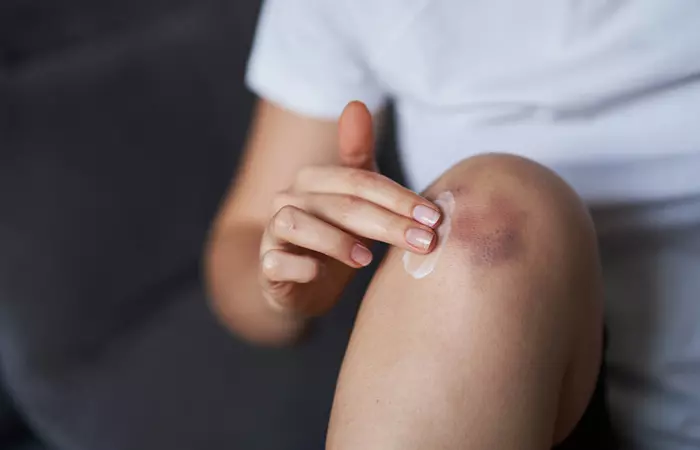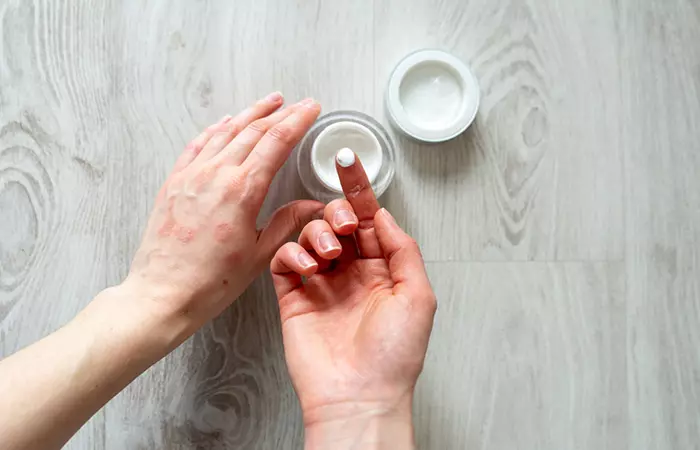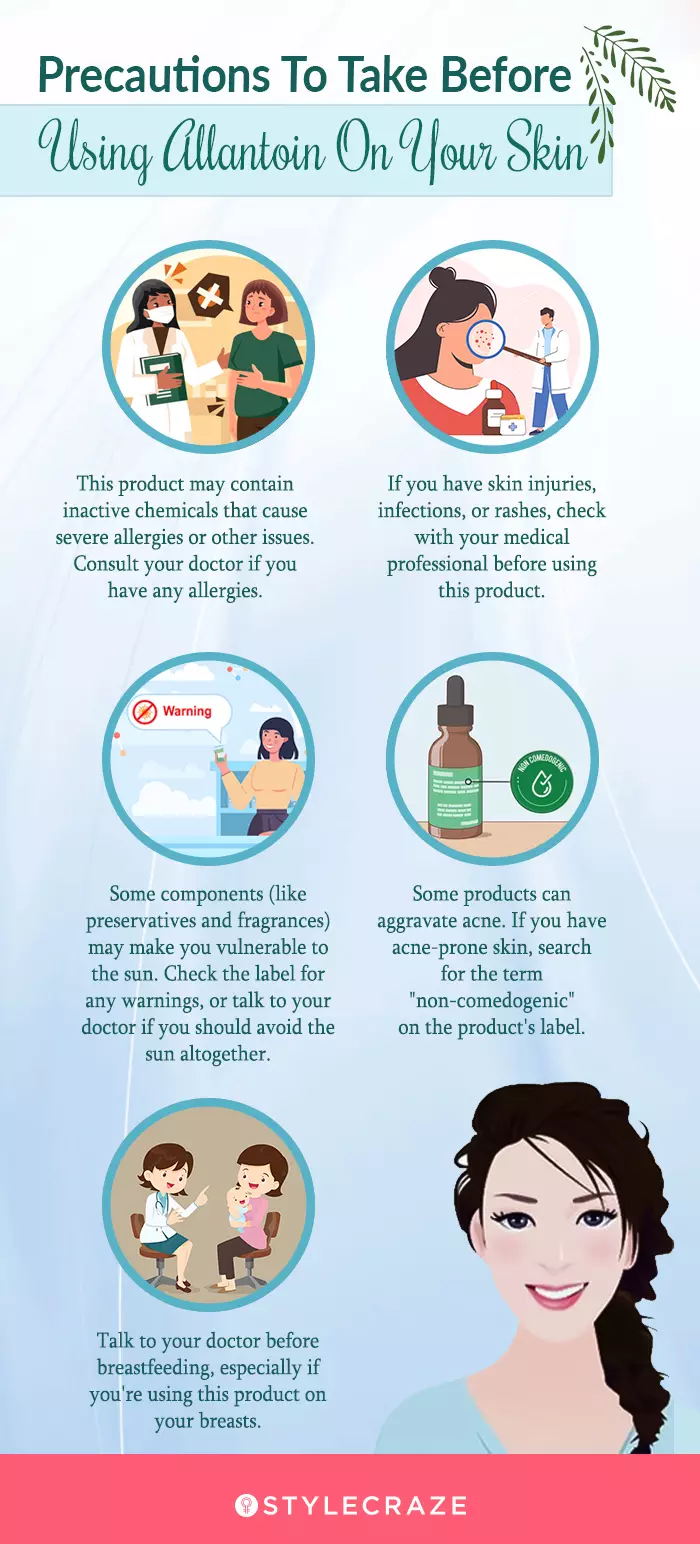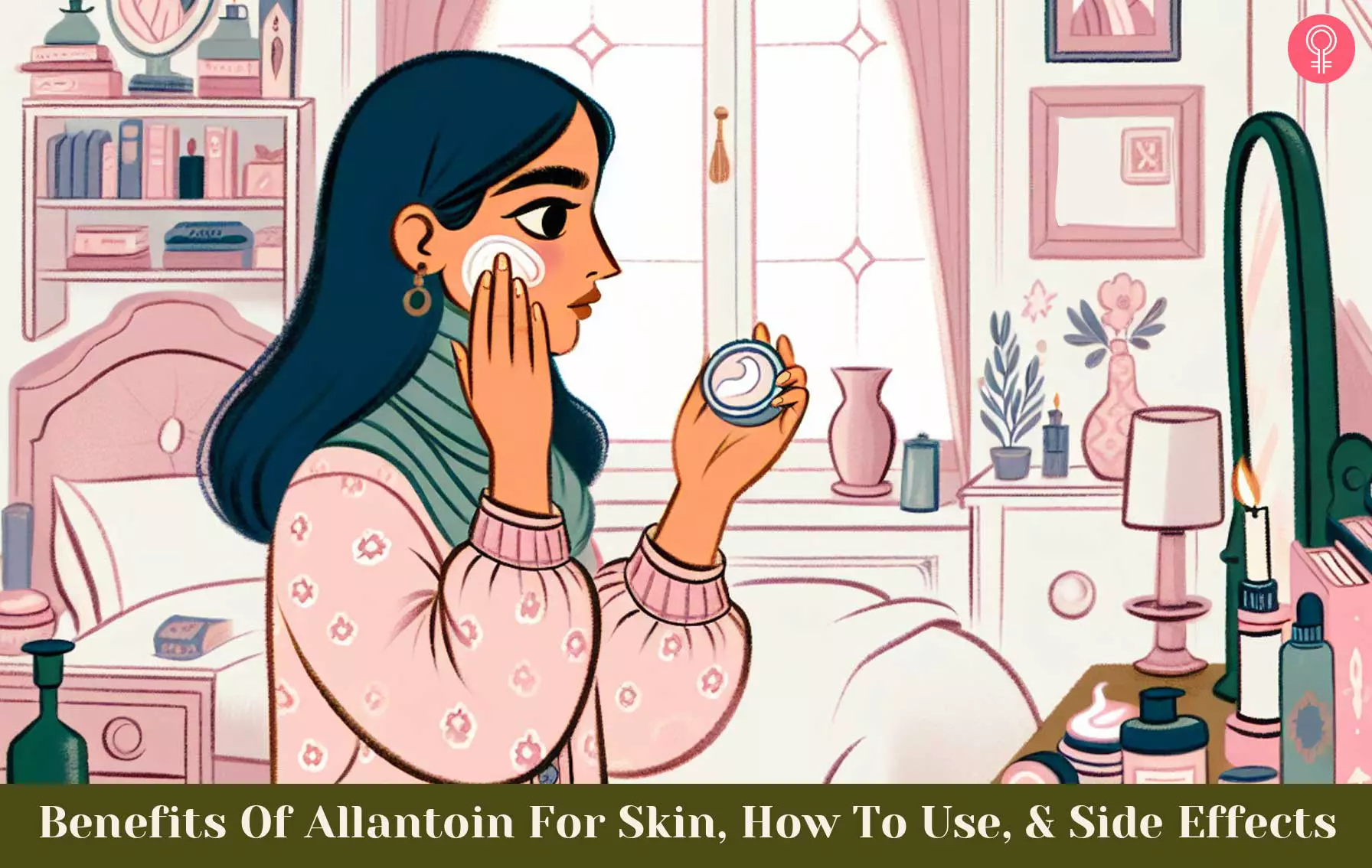What Is Allantoin?
Allantoin is a chemical ingredient and diureide of glyoxylic acid, often used to treat dry, rough, and itchy skin due to its moisturizing, skin smoothing, and wound healing properties (1),(2). What Are Its Benefits? It helps in healing injuries, locking skin moisture, and exfoliating dead skin cells, thus improving overall skin health. It is also effective in treating chronic skin problems like eczema. Who Can Use It? Anyone can use it, but individuals with dry skin will find it more beneficial. How Often? Twice a day is the recommended usage. Caution Avoid combining it with AHAs and BHAs as that can cause redness, over-exfoliation, and skin irritation.
Allantoin also occurs naturally. Comfrey, a shrub that grows in some parts of Asia, North America, and Europe, is a reservoir of allantoin. Existing research attributes a significant number of comfrey benefits to its allantoin content, making it a potent ingredient for ointments, creams, and lotions (3). However, the comfrey plant contains toxins, which may cause serious side effects if used in its natural form. Luckily, its extracts are refined and processed in the labs to remove all toxins to make them suitable for cosmetic and skin care products (4). Allantoin is also found in sugar beets, chamomile, wheat sprouts, and in certain types of bacteria and animals but not as abundantly as in comfrey.
Benefits Of Allantoin For Skin
1. Heals Wounds
Allantoin helps heal wounds, skin injuries, and scars faster. A study analyzed wound records from The Health Improvement Network (THIN) database. In the 2017/2018 period, UK’s National Health Service (NHS) managed an estimated 3.8 million patients with wounds. 89% of acute wounds and 49% of chronic wounds showed signs of healing. However, an estimated 30% of all wounds remained unhealed. These individuals may benefit from using allantoin-based topical creams and formulations. It stimulates the fibroblasts (cells that produce collagen) and boosts extracellular matrix synthesis, leading to the promotion of skin regeneration and cell proliferation. This helps re-establish normal skin on the wound site, making it less visible (5), (6). Comfrey extract may also help manage skin irritation. However, researchers concluded that it is because of the interaction of allantoin with other ingredients present in the extract (7).
2. Anti-Aging Benefits
A study showed that topical application of allantoin and other ingredients could improve skin texture and drastically reduce the appearance of wrinkles and fine lines (8). It also facilitates collagen synthesis, which gives your skin a youthful appearance.
3. Keeps Your Skin Moisturized
Many are unaware of the effectiveness of allantoin for skin moisturization. Allantoin keeps your skin hydrated, plump, and soft by preventing transepidermal water loss which means if you have dry and flaky skin, it can help retain more water to keep the skin moisturized (8), (9), (10).
4. Promotes Skin Exfoliation
Allantoin is a keratolytic agent (10). This means it helps exfoliate dead skin cells and manage conditions where your epidermis produces excess skin cells (such as lesions and warts).
5. Help Manage Eczema
Allantoin, along with other ingredients, can help manage mild to moderate eczemai A non-contagious, inflammatory skin condition triggered by certain foods, causing itchy, scaly, and rough patches. by improving skin hydration, reducing itchiness, and soothing skin because of its anti-inflammatory properties (11). It exfoliates the dry and damaged skin cells to improve skin texture and radiance (12).
6. May Offer UV Protection
Anecdotal evidence suggests that allantoin may offer UV protection while moisturizing the skin. However, there is no scientific research stating the direct role of allantoin in sun protection, and detailed research is warranted. But it can be a perfect addition to your skin care routine to reap the other benefits it offers. For effective sun protection, it is advised to apply a sunscreen containing allantoin as one of the major ingredients to ensure appropriate hydration and protection from UV damage. Allantoin is available as serums, moisturizers (creams and lotions), and gels. You can easily incorporate it into your daily skin care routine. Let’s understand how.
How To Use Allantoin
Cream Or Moisturizer
Serums And Gels
Allantoin is a safe ingredient for your skin. However, avoid combining it with certain ingredients.
Ingredients To Combine And Avoid With Allantoin
Allantoin works well with almost all ingredients (including retinol), especially silicone-based moisturizers and other emollients. However, avoid using it with alpha and beta hydroxy acids, such as glycolic, lactic, mandelic, and salicylic acids. It is because allantoin and AHAsi Alpha hydroxy acids are skin exfoliants that shed the top layer of dead cells to keep the skin even-toned and smooth. and BHAsi Beta hydroxy acids are oil-soluble exfoliants that decongest the skin pores, and clear debris and oils to minimize acne. are skin exfoliants. Combining them may cause over-exfoliation, redness, and skin irritation. The FDA-approved topical application of allantoin at 0.5% to 2.0% concentration is considered safe (13). However, it may cause some side effects. Scroll down to know more.
Side Effects Of Allantoin
Allantoin works as a conditioning agent for your skin. Like most other emollients, it is considered safe. However, if you are allergic to it, you may experience minor side effects, such as:
Itching Skin irritation Redness Burning Stinging
If you use any skin product with allantoin and experience any of these side effects, stop using it immediately and consult a doctor. Is allantoin good for acne scars? Yes, anecdotal evidence suggests that allantoin may reduce the redness caused by acne and help in cell rejuvenation. Can I use allantoin and niacinamide together? Yes, you can use allantoin and niacinamide together to keep your skin moisturized and nourished. Is allantoin cancerous? No, allantoin is considered safe for usage. However, you may develop an allergic reaction to it. Conduct a patch test to check for adverse reactions. Is allantoin good for rosacea? Yes, you can use gentle moisturizers with allantoin to keep your skin hydrated as part of your daily skincare routine (14).
Illustration: Benefits Of Allantoin For Skin How To Use & Side Effects
Learn about allantoin, a natural ingredient found in many skincare products. Also, discover its benefits and how it can improve your skin’s health. Go, take a look at the video.












